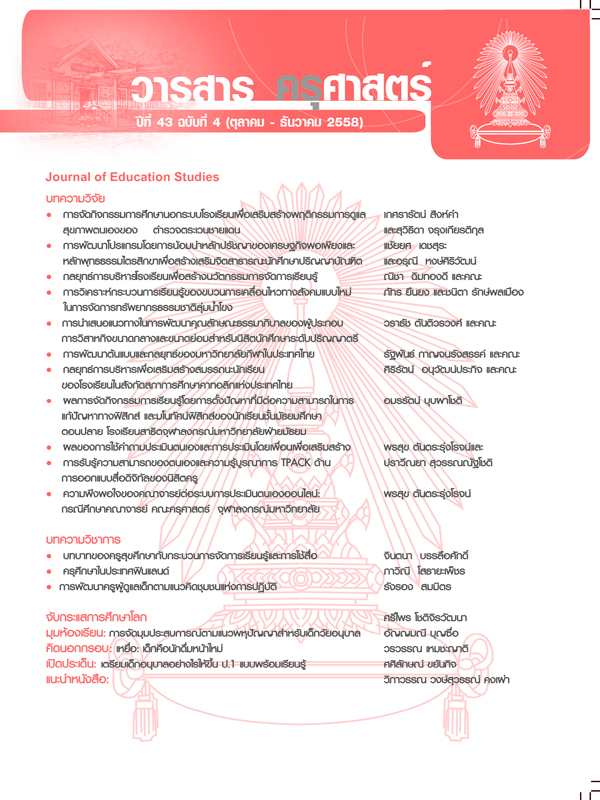ผลการจัดกิจกรรมการเรียนรู้โดยการตั้งปัญหาที่มีต่อความสามารถในการแก้ปัญหาทางฟิสิกส์ และมโนทัศน์ฟิสิกส์ ของนักเรียนชั้นมัธยมศึกษาตอนปลาย โรงเรียนสาธิต สังกัดมหาวิทยาลัยของรัฐในกรุงเทพมหานคร
Keywords:
PROBLEM POSING, PHYSICS PROBLEM SOLVING ABILITY, PHYSICS CONCEPTS, การตั้งปัญหา, ความสามารถในการแก้ปัญหาทางฟิสิกส์, มโนทัศน์ฟิสิกส์Abstract
การวิจัยครั้งนี้เป็นการวิจัยกึ่งทดลอง มีวัตถุประสงค์เพื่อ 1) เปรียบเทียบความสามารถในการแก้ปัญหาทางฟิสิกส์ระหว่างก่อน และหลังเรียนของนักเรียนที่เรียนโดยการตั้งปัญหา 2) เปรียบเทียบมโนทัศน์ฟิสิกส์ระหว่างก่อน และหลังเรียนของนักเรียนที่เรียนโดยการตั้งปัญหา 3) เปรียบเทียบความสามารถในการแก้ปัญหาทางฟิสิกส์ของนักเรียนกลุ่มที่เรียนโดยการตั้งปัญหากับกลุ่มที่เรียนแบบปกติ 4) เปรียบเทียบมโนทัศน์ฟิสิกส์ของนักเรียนกลุ่มที่เรียนโดยการตั้งปัญหากับกลุ่มที่เรียนแบบปกติ กลุ่มตัวอย่างคือ นักเรียนชั้นมัธยมศึกษาปีที่ 6 โรงเรียนสาธิต สังกัดมหาวิทยาลัยของรัฐ ในกรุงเทพมหานคร ที่เรียนในภาคเรียนที่ 1 ปีการศึกษา 2557 จำนวน 2 ห้องเรียน โดยพิจารณาจากค่าเฉลี่ย และส่วนเบี่ยงเบนมาตรฐานของคะแนนสอบวิชา ว33204 ฟิสิกส์ 4 ในภาคเรียนที่ 2 ปีการศึกษา 2556 แบ่งเป็นกลุ่มทดลองจำนวน 30 คน เรียนฟิสิกส์โดยการตั้งปัญหา และกลุ่มควบคุมจำนวน 32 คน เรียนฟิสิกส์ด้วยวิธีสอนแบบปกติ เครื่องมือที่ใช้ในการวิจัยครั้งนี้ คือ 1) แบบวัดความสามารถในการแก้ปัญหาทางฟิสิกส์ มีค่าความยากอยู่ระหว่าง 0.30–0.73 ค่าอำนาจจำแนกอยู่ระหว่าง 0.32-0.54 และได้ค่าความเที่ยงเท่ากับ 0.84 2) แบบวัดมโนทัศน์ เรื่อง ความร้อน และทฤษฎีจลน์ของแก๊ส มีค่าความยากอยู่ระหว่าง 0.30–0.80 ค่าอำนาจจำแนกอยู่ระหว่าง 0.27-0.60 และได้ค่าความเที่ยงเท่ากับ 0.71
ผลการวิจัยสรุปได้ดังนี้ 1) นักเรียนชั้นมัธยมศึกษาตอนปลาย ที่เรียนโดยการตั้งปัญหา มีความสามารถในการแก้ปัญหาทางฟิสิกส์หลังเรียนสูงกว่าก่อนเรียนอย่างมีนัยสำคัญที่ระดับทางสถิติ .05 2) นักเรียนชั้นมัธยมศึกษาตอนปลาย ที่เรียนโดยการตั้งปัญหามีมโนทัศน์ฟิสิกส์หลังเรียนสูงกว่าก่อนเรียนอย่างมีนัยสำคัญที่ระดับทางสถิติ .05 3) นักเรียนชั้นมัธยมศึกษาตอนปลาย ที่เรียนโดยการตั้งปัญหามีความสามารถในการแก้ปัญหาทางฟิสิกส์สูงกว่านักเรียนที่เรียนแบบปกติอย่างมีนัยสำคัญที่ระดับทางสถิติ .05 4) นักเรียนชั้นมัธยมศึกษาตอนปลาย ที่เรียนโดยการตั้งปัญหามีมโนทัศน์ฟิสิกส์สูงกว่านักเรียนที่เรียนแบบปกติออย่างมีนัยสำคัญที่ระดับทางสถิติ .05
The purposes of this research were: 1) to compare the problem solving abilities of an experimental group learning by using problem posing to organize learning activities before and after the treatment; 2) to compare physics concepts of the experimental group learned by using problem posing to organize learning activities before and after the treatment; 3) to compare the problem solving abilities of students between the experimental group learned by using problem posing to organize learning activities and the control group learned by the conventional method; and 4) to compare physics concepts of students between the experimental group learned by using problem posing to organize learning activities and the control group learned by the conventional method. The sample of this study included 62 Mathayomsuksa 6 students of Chulalongkorn University Demonstration Secondary School, during the second semester of academic year 2014. The sample was divided into two groups: the experimental group with 30 students and the control group with 32 students. The research instruments were 1) the problem solving ability test, and 2) a test on the concepts of physics.
The research findings are summarized as follows: 1) After the treatment of the problem solving ability of the students in the experimental group learning by using problem posing to organize learning activities was higher than before the treatment at the .05 level of significance; 2) After the treatment of the physics concepts on the students learning by using problem posing in organizing learning activities was higher than before the treatment at the .05 level of significance. 3) The mean score of the problem solving ability test of the experimental group was higher than the mean score of the control group at a .05 level of significance. 4) The mean score of the test of physics concepts on the experimental group was higher than the mean score of the control group at a .05 level of significance.




